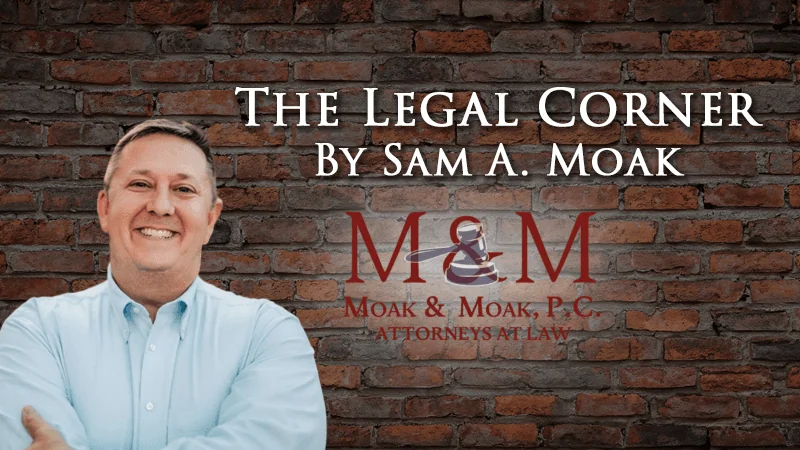The information in this column is not intended as legal advice but to provide a general understanding of the law. Any readers with a legal problem, including those whose questions are addressed here, should consult an attorney for advice on their particular circumstances.
Last week I warned you about living trust scams often perpetrated on consumers, particularly baby boomers and the elderly. This week I will point out some of the more common statements made in an effort to convince someone they need a Living Trust.
Fraudulent and Misleading Statements Used in Living Trust Scams
Con artists promote their business by making false or incomplete statements about the probate process, guardianships and the taxation of estates. Such statements include:
1. “Living trusts save taxes.”
Misleading. Most Texans’ estates will face no estate taxes at all. In fact, unless your assets total greater than $5.34 million dollars, your estate is exempt. It’s twice that for a couple. If your estate is taxable, a Will can accomplish exactly the same tax savings as a trust at a much cheaper cost.
A living trust is a revocable trust, which means that it can be amended or terminated by the settlor. The settlor is the person who owns the trust or creates the trust. In Texas, all trusts are considered revocable unless the trust document expressly states otherwise.
Traditional testamentary planning (wills) and revocable trusts planning (living trusts) are subject to essentially the same tax consequences and planning opportunities. The creation and funding of the living trust are not taxable events for gift tax purposes because of the power of revocation. During the settlor’s remaining lifetime, the settlor will be treated as the owner of the revocable trust assets for income tax purposes. The assets of the revocable trust will be included in the settlor’s estate for tax purposes upon the settlor’s death. Further, due to the Taxpayer Relief Act of 2012, there remains very little difference in the post-death income tax treatment of living trusts and probate estates. Consequently, tax savings is not a good reason to implement living trust planning.
2. “Living trusts will help you qualify for public assistance benefits.”
False. I recently had a client come in for me to review/update her power of attorney documents and she mentioned she had created a Family Trusts in order for her husband to qualify for Medicaid. This is always a Red Flag for me. A living trust will not help you qualify for public assistance benefits, particularly nursing home Medicaid benefits. In fact, your home could lose its exclusion status and therefore be considered an asset. Withdrawals of corpus are treated as “income” which could affect eligibility. Finally, a gift from the trust is subject to the 60 month lookback period for Medicaid qualification. This means a gift received from the trust while you are on Medicaid or within 60 months before you go on Medicaid could jeopardize your Medicaid eligibility. Finally, if the trust is “revocable,” it is no good for Medicaid planning, A "revocable" trust is one that may be changed or rescinded by the person who created it. Medicaid considers the principal of such trusts (that is, the funds that make up the trust) to be assets that are countable in determining Medicaid eligibility. Thus, revocable trusts are of no use in Medicaid planning.
3. “Living trusts help you avoid contested Wills.”
Misleading. Because a “trust” and a “Will” are separate legal concepts, a trust is not subject to a Will contest. However, trusts, like Wills, are subject to attack on the basis of lack of capacity, undue influence, and fraud. If you have a disgruntled family member who is inclined to challenge a Will, they will also challenge a trust.
4. “Living Trusts help you avoid your creditors.”
False. During your lifetime, assets in a living trust are subject to the claims of your creditors. After death, these assets are subject to the claims of your estate’s creditors.
5. “Probate requires excessive time and money.”
False. Texas law gives the person making a Will the option of creating an independent administration. Independent administrations account for more than 80 percent of Texas probates and involve only one court hearing and the filing of an inventory. Further, if there are no debts outstanding other than those secured by real estate, the Will can be admitted to probate as a muniment of title, thereby avoiding any type of administration.
6. “Probate takes years to complete.”
Misleading and Very Unlikely. Non-taxable probate estates generally take less than a year to complete. There are rare circumstances where families and/or the IRS fight for an extended period after a death. Such disputes can cause delays in the administration of either a probate or a living trust. In most circumstances, the administration of a living trust is no more time efficient than the administration of a will in probate.
7. “Everyone should have a living trust.”
False. While a living trust is appropriate for some people, the cost of creating, funding and administering a living trust outweighs the benefits for many people. The real question is whether the anticipated reduction in future probate costs will be offset by the immediate cost of creating, funding and administering the trust during the remainder of the person’s lifetime. In some limited instances, such as owning property out of state or a person’s inability to manage their assets, a living trust is warranted. But, it is important to decide what your needs are before creating a living trust.
8. “The living trust is the only way to avoid probate.”
False. If your goal is to avoid probate, there are several ways to do so. Joint tenancy with rights of survivorship and multiple party accounts with financial institutions are common and inexpensive methods of avoiding probate. However, always consult with an attorney before proceeding with these options, as they frequently conflict with your current estate planning and you may subject your family to capital gains taxes.
Because my practice is focused on estate planning and probate, I see many families that have purchased a living trust. In almost every case, the living trust is incomplete. The person who sold them the trust did not complete the job. Unfortunately, this means more money has to be spent to complete the living trust and, if the person has passed, their estate still must file the pour over Will included in the living trust. Thus, they have spent a great deal of money on something that gave them a false sense of security.
In addition to not completing the trust, most folks are shocked to find out they must maintain the trust. This requires diligence in following the trust when property is sold or purchased and of course, additional expense.
I am not advocating Wills over trusts. There are family situations that are best served by the use of a trust. However, a living trust is not usually the correct instrument. Family situations like a special needs child, owning real estate outside of Texas, and protection of real estate that the family wants to be used in a particular manner are examples. However, these situations require special kinds of trusts and not necessarily a living trust.
Remember the best defense is to not act hastily and to seek advice from a trusted professional such as your accountant, estate planning attorney, banker or financial advisor.
If you feel that you have been a victim of a con artist, living trust salesperson, or an unethical attorney, please contact the State Bar of Texas. While non-attorneys are not subject to State Bar rules, they may be practicing law without a license.
Sam A. Moak is an attorney with the Huntsville law firm of Moak & Moak, P.C. He is licensed to practice in all fields of law by the Supreme Court of Texas, is a Member of the State Bar College, and is a member of the Real Estate, Probate and Trust Law Section of the State Bar of Texas.


